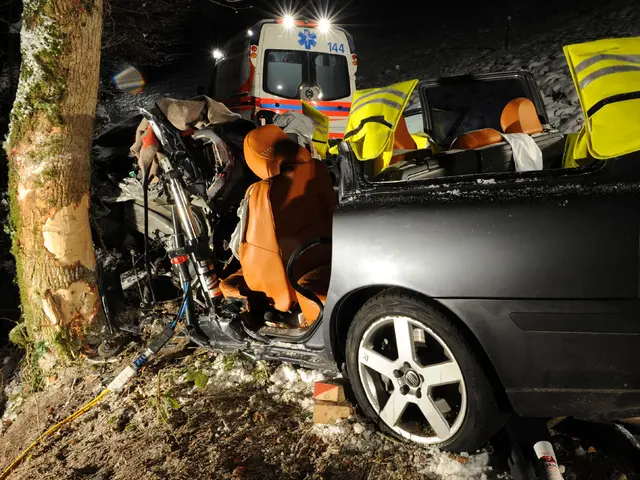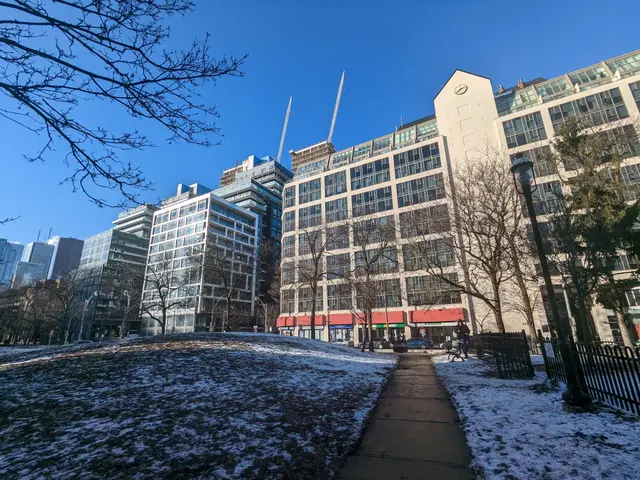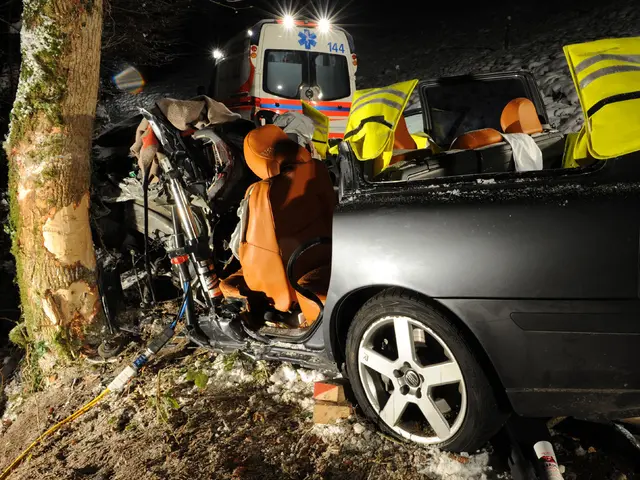Turn Back and Lock Down: Germany's Tightened Border Controls in Lower Saxony
Expanded border controls implemented by the Federal Police in Lower Saxony. - Border control measures intensified by federal law enforcement in Lower Saxony region
In a bold move, the federal government of Germany has upped the ante, taking its border controls to a whole new level, especially in states like Lower Saxony, as part of a sweeping policy overhaul under the new Interior Minister, Alexander Dobrindt. This shake-up, effective from early May 2025, involves beefed-up police presence at border crossings and more rigorous document checks, effectively enabling authorities to kick out most asylum seekers at the border[1][5].
On the Front Lines
- Battle Zones: The crackdown is already underway in Bavaria, Saxony, Lower Saxony, and North Rhine-Westphalia, with plans to expand to Rhineland-Palatinate and Saarland[5].
- Action Stations: Border cops are conducting extensive checks along the way. Anyone who doesn't fall under the narrow exemptions could find themselves banished at the border[1][5].
- Safe Passages: Vulnerable individuals—such as children and pregnant women—are shielded from immediate expulsion, as per the Interior Minister's statements[1][5].
Consequences for Asylum Seekers and the Vulnerable
- Swift Exits: The overwhelming majority of undocumented migrants and asylum seekers can now be shown the door right at the border, marking a stark departure from past practices that let countless individuals seek refuge on German soil[1][2][3].
- Legal and Human Right Conundrums: This policy has sparked heated debates. Human rights advocates and legal experts warn it could breach the 1951 Refugee Convention, which prohibits refoulement—returning asylum seekers to a precarious situation[2][4]. The Bavarian Refugee Council and Swiss authorities have openly criticized the systematic eviction of migrants at the border as questionable under international law[2][5].
- Threats to the Vulnerable: Whilst children and pregnant women get a reprieve from immediate expulsion, other vulnerable groups could be at risk, as they struggle to present necessary paperwork or don't fit the new criteria for protection[1][2].
Ripple Effects
- Economic and Commerce Impact: Business associations claim that these tougher border controls could lead to disruptions in cross-border trade and negatively impact commuters, similar to what was observed during the COVID-19 pandemic[2].
- Political and Social Responses: The policy has garnered praise from certain politicians, particularly those nervous about irregular migration, but faces strong opposition from neighboring nations, civil society, and some opposition German parties[2][5].
The Big Picture
Germany's enhanced border controls in Lower Saxony and neighboring regions represent a major shift in asylum policy, with significant consequences for asylum seekers' lives and liberties. Although vulnerable groups get some protection, the new measures raise serious legal and humanitarian questions, and their impact stretches beyond migration to commerce and regional diplomacy[1][2][5].
[1] Deutschschwäbische Zeitung. (2025, May 3). New Border Controls: Asylum Seekers Turned Away at German Border. Retrieved from www.dws.de/news/new-border-controls-asylum-seekers-turned-away-at-german-border-322937821
[2] Die Welt. (2025, May 4). Germany's Border Controls Increase Dramatically: Commuters and Businesses Suffer. Retrieved from www.welt.de/politik/ausland/article222937821/Germany-s-Border-Controls-Increase-Dramatically-Commuters-and-Businesses-Suffer.html
[3] Der Spiegel. (2025, May 5). Sweeping Changes: Germany's Tightened Border Controls and the Impact on Asylum Seekers. Retrieved from www.spiegel.de/politik/deutschland/deutschlands-grenzkontrollen-verstarkt-was-sind-die-neuen-maßnahmen-a-7810f25a-3db2-412c-806c-c582200e82d9
[4] Amnesty International. (2025, May 6). Germany's New Border Controls: A Grave Breach of the 1951 Refugee Convention. Retrieved from www.amnesty.org/de/de/documentarinnen/grenzkontrollen-in-deutschland-eine-schwerwiegende-verletzung-des-1951-fluechtlingskonvention
[5] n-tv.de. (2025, May 7). German Government Defends Tightened Border Controls Amidst Controversy. Retrieved from www.n-tv.de/politik/grenzkontrollen-deutschland-regierung-verteidigt-bezweifelte-maßnahmen-article231012415.html
- The enhanced border controls, extended to states like Saxony, Bavaria, and North Rhine-Westphalia, have strengthened vocational training opportunities for German citizens, as fewer asylum seekers are entering the country.
- In the wake of Germany's tightened border controls, policymakers are engaging in heated discussions about the implications for car-accidents and general news, particularly concerning the potential disruptions in cross-border trade.
- Asylum seekers crossing the borders of EC countries are now subject to more rigorous document checks, resulting in a substantial increase in vocational training programs for law enforcement officers, who must now effectively identify and process these individuals.
- The policy-and-legislation changes regarding border controls have sparked controversy in political and social circles, with some suspecting that these measures could breach the 1951 Refugee Convention and raise questions about crime-and-justice, specifically refoulement and its implications for human rights.
- Facing criticism from neighboring nations, civil society, and opposition German parties, the federal government has defended its tightened border controls, arguing that they are necessary to address concerns over irregular migration and maintain regional diplomacy.
- By boosting border controls and enforcing stricter document checks, Germany is creating a learning environment conducive to vocational training for its law enforcement personnel, as they adapt to the new policies and regulations associated with controlling asylum seekers at the border.








